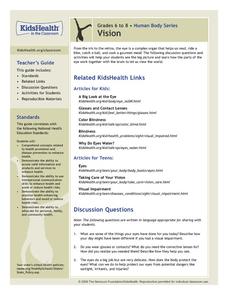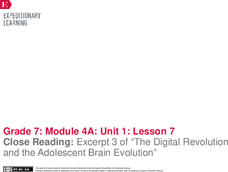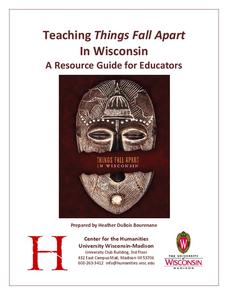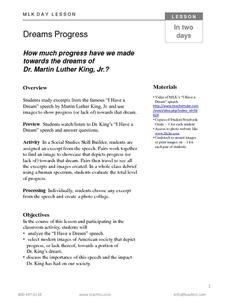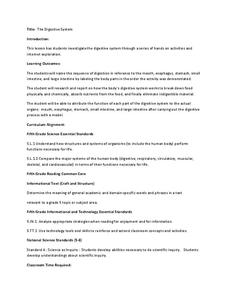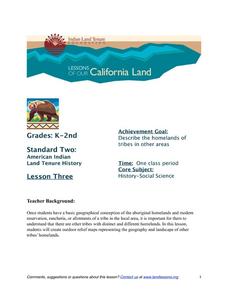Pulitzer Center
The Global Water Crisis
High schoolers examine the "quiet crisis," the lack of clean water, by reading articles and viewing video clips. They discuss the situations in Ethiopia, Yemen, Kenya, and Nepal. There are two options for the lesson, but one of them...
National Gallery of Canada
Morphosis
Experience anthropomorphism and metamorphosis in action with flipbooks! Instead of giving human characteristics to animals, though, pupils will show a transformation from human to animal or vise versa through their drawings. The...
National Security Agency
What’s Your Coordinate?
Your middle schoolers will show what they know with their bodies when they become the coordinate plane in this conceptual development unit. Starting with the characteristics of the coordinate plane, learners develop their skills by...
Curated OER
Hands on Your Heart - Biology Teaching Thesis
Young scholars are able to recite the circulation of blood through the heart's various cavities and valves. They are able to appreciate what the actual valves and chambers of the heart look like. Students also have a clear vision of why...
Nemours KidsHealth
Vision
From the iris and retina to glasses and contact lenses, learners will be excited to see what activities are in store for them as they learn about the complex organ of the human eye.
University of Minnesota
Ways of Knowing: Apples as Models
Use apples as a way of thinking about models. Young scientists consider how the word apple, a two-dimensional drawing, a three-dimensional image, a photograph, and plastic apples all model real apples in preparation for developing models...
ReadWriteThink
Teaching Point of View With Two Bad Ants
What better way to explain the concept of point of view than from an ant's perspective! After reading Two Bad Ants, pupils identify the point of view of the ants by studying the text and pictures. Then, they fill out a chart that...
Serendip
Food, Energy and Body Weight
High schoolers learn why humans need calories, how they control weight with food choices, and the impact of exercise on energy. Scholars then apply their understanding to a case study of lunch choices and exercise.
EngageNY
Close Reading: Excerpt 3 of “The Digital Revolution and the Adolescent Brain Evolution”
It's time to level up and discover how video games affect the brain. Pupils explore the topic as they continue reading excerpts from an article about adolescent brain development and the digital revolution. Scholars also participate in a...
Curated OER
Exploring Emotions Through Activities
You'll definitely want this rich compilation of worksheets and activities in your toolbelt as you review and discuss the range of emotions we have as human beings. Activities include defining feelings, identifying ways we express...
EngageNY
Grade 9 ELA Module 1, Unit 1, Lesson 15
How much progress has Claudette made at the end of "St. Lucy's Home for Girls Raised by Wolves"? Ninth graders note evidence for and against Claudette's successful adaptation into human society with a graphic organizer. Additionally,...
EngageNY
Grade 9 ELA Module 1, Unit 1, Lesson 16
Prepare for the end-of-unit assessment in a unit focused on Karen Russell's "St. Lucy's Home for Girls Raised by Wolves." As your class continues gathering evidence to support or argue against the success of Claudette's adaptation into...
EngageNY
Grade 9 ELA Module 4, Unit 1, Lesson 16
The Sugar Changed the World chapter, "The Sound of Liberty," highlights how the differing attitudes toward the slave trade shifted the issue from an economic concern to a concern for human rights. The passage contrasts Thomas Jefferson's...
WE Charity
High School–Module 3: Food Waste
Advances in packaging and refrigeration help keep food fresher longer. That's just one of the ways science is addressing global food waste. With the third of five lessons from the WE Are Innovators—High School Modules set, scholars use...
University of Wisconsin
Teaching Things Fall Apart in Wisconsin: A Resource Guide for Educators
“There is no story that is not true, . . .” And uncovering the truths in Things Fall Apart is the focus of a 68-page resource packet designed to provide instructors with a wealth of materials that enhance understanding of Chinua Achebe’s...
Curated OER
Grand Canyon Suite
Take a trip to the Grand Canyon! Lesson one explores how Ferde Grofe painted a musical landscape of America when he wrote the Grand Canyon Suite. Learners then examine art that shows the Grand Canyon in lesson two. Finally, lesson three...
TCI
Dreams Progress
Has society progressed to the dream Martin Luther King Jr. expressed in his famous address during the civil rights movement? Learners work with a partner to analyze one excerpt from King's "I Have A Dream" speech and find a current image...
Curated OER
The Digestive System
Discover how the human body's digestive system works with a brain and stomach friendly activity. Scholars taste test a variety of foods to find out how they behave once in the mouth. Class members then play a game called Move That...
Texas Center for Learning Disabilities
Second and Third Grade Explicit Phonics Intervention
Support all young learners on their journey to literacy with this five-lesson reading intervention unit. Following a clearly outlined format, each lesson first engages children in practicing their phonemic awareness and phonics skills...
Healthy Native Youth
Chapter 2: Learning About Adolescence
The Native American symbol, The Circle of Life, represents life's spiritual, physical, mental, and emotional well being. By way of deep discussion, and two games, the lesson uses the Circle of Life to explore the stages of maturity,...
Baylor College
We Need Water
There's nothing quite like a glass of ice-cold, freshly squeezed lemonade. Lesson seven of this series explains how the water humans need to survive can come in many forms. Teach your class about how much water humans require every day...
Peace Corps
Introducing Culture
Growing up within a culture leaves a lot of ideas and values unspoken. Take a closer look at the cultures in which your learners live with a discussion activity that addresses cultural identity and traits of those living within the...
Baylor College
Plant Parts You Eat
Plants provide a variety of delicious foods essential for human survival. In the fourth instructional activity of this series on food science, young scientists investigate common fruits, vegetables, and grains in order to determine which...
Indian Land Tenure Foundation
More Tribal Homelands
Here is a very fun idea that introduces young learners to how geographical location affects cultural development. They are introduced to four areas where Native Americans have lived in the past by reading stories and examining images....
Other popular searches
- Human Development Index
- Stages of Human Development
- Human Development Baby
- Human Development Psychology
- Human Development Embryo
- Health Human Development
- Health and Human Development
- Biology Human Development
- Human Development Cell
- Fetal Development Human
- Growth and Human Development
- Adult Human Development






